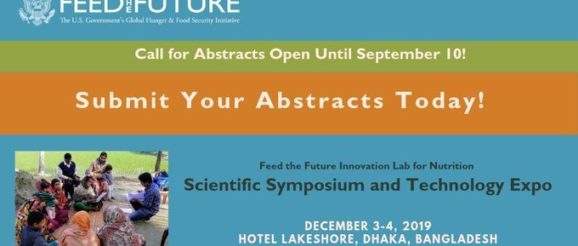Feed the Future Innovation Lab for Nutrition Scientific Symposium in Bangladesh

Feed the Future Innovation Lab for Nutrition Scientific Symposium in Bangladesh
Feed the Future Innovation Lab for Nutrition Scientific Symposium in Bangladesh, December 3-4, 2019 at Hotel Lakeshore, Dhaka
Funded by USAID, and being co-hosted in collaboration with the Horticulture Innovation Lab at UC Davis and Helen Keller International.
You are invited to submit abstracts on research focused on agriculture – nutrition pathways. We welcome abstracts that cover cross-cutting and interdisciplinary research as well as those within-disciplinary boundaries that demonstrate their relevance to understand these complex pathways. Submitted abstracts should clearly link to one of the of symposium’s themes.
Symposium Themes:
Track-1: Linkage between agriculture, nutrition and health
Track-2: Developing climate resilience and gender equity for nutrition and health
Track-3: Designing and enabling environment for Public Private Partnership
Track-4: Existing policies and way forward
Guidelines for Abstract Submission
Please carefully review all guidelines prior to developing your abstract. Abstracts will be considered for oral or poster presentation. Instructions for abstract submission must be strictly followed to be considered for presentation.
Instructions for Abstract Submission:
Please follow the format below for your abstract:
Queries can be sent to: [email protected]
Standards of Evidence
Abstracts are invited to be submitted for review using the following type of research and study designs. Directly addressing the causal pathway includes efficacy and effectiveness research that can directly evaluate impact. Efficacy is the extent to which an intervention (technology, procedure, service, food delivery, and nutrients) improves a condition when known to be delivered through a defined system. Effectiveness refers to effects of an intervention when delivered under usual program conditions. Both are best determined by the conduct of randomized field trials, which can vary in design and detail. Pseudo-experimental designs, including non-random allocation and before-after evaluations, offer a lesser degree of evidence on cause and effect, but are often an only option. Non-intervention evidence can offer strength in association that may be consistent with impact or raise hypotheses about impact and modifiable risk factors. Epidemiological approaches can link individual exposures to status or outcomes. Marketing studies can track food product flow, value added and present evidence of availability and access. Ecological studies relate to community characteristics and associations that may reflect food security in an area. Surveys provide cross- sectional descriptions of existing situations, status profiles and prevalence in a population. Surveillance reveals trends in health and nutritional status, dietary availability, access and intake, over time, typically assessed as community panels or longitudinally in individuals. Qualitative studies must present how and why specific legitimizing criteria (theory and methods) were chosen in ensuring the robustness of their inquiries.
Selection process
Abstracts will be reviewed by an expert panel comprising of academics with varied topical expertise. Abstracts will be selected based on relevance to event themes and, clarity, quality and merit of research and abstract. Work in progress will be considered only for posters.
